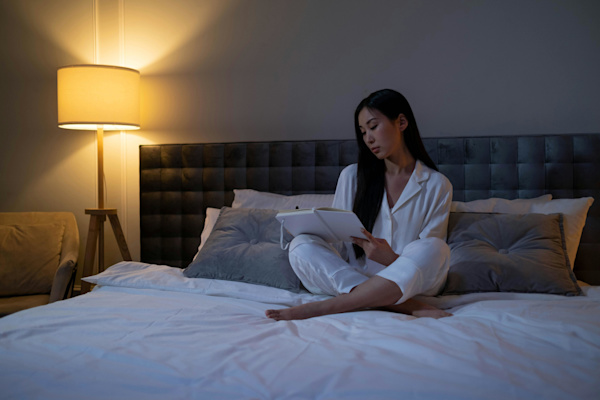
How to Sleep Better When Anxiety Keeps You Awake
From Racing Thoughts to Restful Sleep
Are you wondering how to fall asleep with anxiety? Anxiety and sleep often feel like opposing forces. When your mind is racing with worry, drifting into a peaceful slumber can seem impossible.
The good news is that by adopting a few mindful habits and making small changes to your routine, you can break the cycle of anxiety and sleeplessness.
At Mudita, we believe that everyone deserves a good night’s sleep. That’s why we’ve created a line of mindful alarm clocks designed to help you relax and unwind before bed.

Mudita Harmony 2 Relaxation Library
We’ve also put together this list of tips for sleeping better when anxiety keeps you awake by going over natural sleep remedies, sleep hygiene tips, and strategies to improve your sleep quality.
We hope it helps!
Now, let’s get into it.
1. Create a Calming Nightly Routine
Never under estimate the power of an offline bedtime routine. Our brains LOVE routines and when we create a calming nightly routine, our brains know that it’s time to wind down and get ready for sleep.
That’s why having a consistent, soothing routine before bed is one of the first things you can do to signal to your body that it's time to wind down.
Incorporate relaxing activities like reading, meditating, gentle stretching, or a warm bath into your evening schedule. These rituals help align your body with its natural sleep cycle, promoting restful sleep.
Mindful activities such as mindful journaling or listening to ambient sounds or soothing music on your Mudita Harmony can enhance your sense of calm.
Create an offline bedtime routine with Mudita
READ: The Benefits of Mindful Journaling
Stick to this routine nightly to establish a healthy sleep pattern, improving sleep efficiency over time.
2. Be Mindful of Caffeine and Alcohol
Caffeine and alcohol are common culprits behind disrupted sleep. While caffeine is a known stimulant, alcohol, though sedative at first, can disturb your sleep cycle later in the night.
Additionally, be mindful of foods and beverages which contain caffeine, such as chocolate or black tea. Even green tea contains caffeine, albeit in small amounts.
When it comes to chocolate, though, the amount varies depending on the type of chocolate. Here's a general breakdown:
Dark chocolate typically contains the most caffeine, ranging from 12 to 60 milligrams per ounce, depending on the cocoa content.
Milk chocolate has less caffeine, with about 5 to 10 milligrams per ounce. However, here, the sugar content can also affect your sleep.
White chocolate contains no caffeine because it is made from cocoa butter without the cocoa solids that contain caffeine. With white chocolate, it’s also wise to look at the sugar content.
In addition to caffeine, chocolate also contains theobromine, a related compound that can have similar stimulating effects, though it is generally milder than caffeine. The higher the cocoa content in chocolate, the more caffeine and theobromine it is likely to contain.
Instead, opt for calming herbal teas like chamomile or peppermint to aid relaxation. By avoiding these disruptors, you’ll enhance your chances of sleeping well and waking up refreshed.
3. Limit Screen Time Before Bed
This one is KEY! Screens emit blue light, which hinders melatonin production, making it harder to fall asleep. Scrolling through social media or emails can also seriously amplify stress and anxiety.
That’s why it’s important to reduce screen use at least an hour before bedtime and consider replacing it with a more relaxing activity, such as reading a physical book or practicing a creative hobby.
If using your phone as an alarm clock is too much of a temptation, consider switching to a mindful alarm clock, like Mudita Bell or Mudita Harmony.
Prioritizing a screen-free hour before bed is a powerful step toward better sleep hygiene and overall sleep health.
4. Practice Deep Breathing or Meditation
Relaxation techniques like deep breathing and mindfulness meditation can ease anxious thoughts and calm your mind. Try the “4-7-8” breathing technique: inhale for four counts, hold for seven, and exhale for eight.
This method slows your heart rate and prepares your body for restful sleep.
Mindfulness meditation encourages you to focus on the present moment, helping you let go of racing thoughts. If you have a Mudita Harmony alarm clock, you can even upload guided sessions that are perfect for bedtime. With practice, these strategies can help you establish healthier sleeping habits.
Additionally, you can try the cognitive shuffle, a cognitive strategy meant to help you fall asleep fast. We wrote all about it in another article on our blog:
READ: What is Cognitive Shuffling? A New Way to Fall Asleep Faster
5. Write Down Your Worries
When your mind feels overwhelmed, mindful journaling can be a powerful tool. Writing down your thoughts allows you to externalize your worries, freeing up mental space for rest.
Keep a notebook by your bedside for late night worries or try a gratitude journal to shift focus to positive thoughts.
This practice not only helps improve sleep quality but also supports emotional wellness, creating a foundation for sound sleep.
6. Maintain a Consistent Sleep Schedule
We write a lot about keeping a consistent sleep schedule because consistency is key to achieving restorative sleep.
Make sure you go to bed and wake up at the same time every day, even on weekends and holidays. This regularity helps regulate your body’s internal clock, or circadian rhythm, ensuring better sleep quality.
Also, avoid long daytime naps, as they can disrupt your nighttime sleep. If you need a nap, keep it short, around 20 to 30 minutes is ideal.
Did you know that Mudita Harmony comes with a Power Nap feature?
Over time, a regular sleep schedule will make falling asleep easier and improve your overall sleep health.
7. Optimize Your Sleep Environment
Your bedroom should be a sanctuary devoted to sleep. A comfortable and relaxing bedroom can work wonders for your sleep hygiene. Keep your room cool, dark, and quiet to create an environment conducive to sound sleep.
Use blackout curtains to block external light and consider a device which can play white noise to mask distracting sounds, like Mudita Harmony (or try earplugs).
Incorporate calming scents like lavender, which has been shown to reduce anxiety and promote relaxation. Comfortable bedding and pillows are also essential for a good night’s sleep. Limit your bedroom activities to sleep and relaxation to strengthen the mental association with rest.
The Importance of Healthy Sleep Habits
Sleep is a cornerstone of well-being. Poor sleep can exacerbate anxiety, while restful sleep helps regulate emotions, improve focus, and enhance overall health.
By implementing these strategies, you can improve your sleep hygiene and cultivate habits that lead to better sleep naturally.
Whether it’s maintaining a consistent sleep routine, practicing mindfulness, or creating a serene environment, small, mindful changes can have a profound impact.
Prioritize your sleep because it’s one of the most powerful tools for navigating life with clarity and calm.
Let these tips guide you toward restful nights and brighter days ahead.
Related stories

What Is Sleepmaxxing? The Trend for Your Best Night’s Sleep
Discover Sleepmaxxing, the viral trend elevating sleep into a self-care ritual. Optimize rest with sleep hygiene, tech-free zones, and mindful alarm clocks.

Mindful Gift Ideas for a More Meaningful Holiday Season
Mindful gifts for a meaningful holiday: Mudita's collection inspires tranquility, sustainability, and connection. Perfect for intentional giving.

Why a Mudita Alarm Clock is The Most Sought-After Gift Of 2024?
Give the gift of better mornings! Discover why a mindful alarm clock is the perfect holiday present - practical, stylish, and designed for healthier sleep.
If you'd like to receive the best stories from our blog, keep up to date with our progress and get notified about our product releases and special discounts.